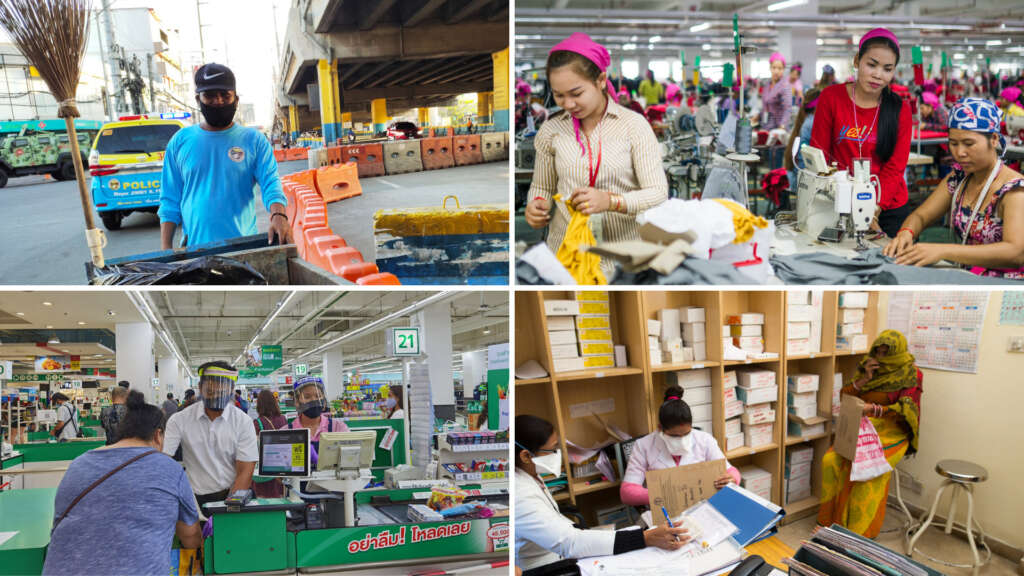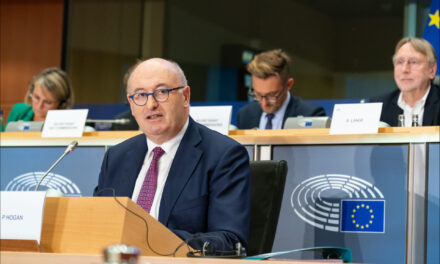
From left to right (clockwise): (1) A street sweeper maintains cleanliness of major roads amid the COVID-19 pandemic, Muntinlupa City, Philippines. (2) Garment Workers in Cambodia. (3) Healthcare workers fighting against TB in India. (4) Supermarket cashiers wear masks and face shields to maintain physical distance as grocery shopping has changed amid COVID-19, Bangkok, Thailand. All pictures © ILO Asia-Pacific.
1 May, 2022
Statement from Focus on the Global South
Workers across the world have faced a series of immense setbacks with the advance of neoliberalism and expansion of global value chains that have been exacerbated in the past two years. They have borne the brunt of pandemic induced economic disruptions, wage cuts, precarious employment, job losses and inflation, resulting in large-scale distress migration within and across borders. In the Asia-Pacific region alone, millions of job losses have been reported along with informalisation and under-employment. This compounding of wage insecurity, precarity and informalisation across Asia has a clear gender bias and is happening amidst a worsening climate emergency. In addition, repression of workers and anti-union policies have created a climate of fear and intimidation and enabled violations of hard-won labour rights.
At the same time, the pandemic demonstrated the critical and frontline role of workers in upholding the economy and in delivering essential goods and services, most significantly in health care, food and agriculture, but also in transport, infrastructure building and maintenance, and education among others. In addition, the pandemic underscored the importance of care work–still unrecognised and undervalued–in all productive activities. It is a matter of great concern that despite the heroic contributions of urban and rural workers, especially women, in preventing economic and social breakdowns, governments in Asia are adopting economic policies and programmes that undermine labour rights, and favour the corporate private sector over strengthening public goods, services and employment programmes.
The past two years have witnessed consistent, systemic weakening of labour and environmental laws and regulations, coupled with a grotesque rise of corporate power and wealth. Public goods and services, including health care, education, public distribution of food, water, sanitation, energy and transportation continue to be privatised and underinvested, with practically no social protection and safety nets for millions that constitute the poor and the precariat. Corporate private sector interests are at the center of economic recovery strategies. For instance, the Cambodian Government’s new investment law privileges the interests of foreign firms at the cost of workers rights, community livelihoods and environmental protection. Recent labour law revisions in India will lead to a suppression of minimum wages and the weakening of unions and industrial safety protocols. In the Philippines, the failure of the Duterte administration to pass legislation that puts an end to the practice of labour contractualisation, coupled with the aggressive push to further liberalise the economy through trade agreements such as the Regional Comprehensive Economic Partnership (RCEP), and amendments to laws governing foreign investments and public services, have further exacerbated job insecurity. In Thailand, tax-exempted economic corridors and state-sponsored large-scale monocultures will deepen the country’s existing economic and social disparity while the growth of corporate monopolies continues to destroy workers’ bargaining capacities for better labour and social protection systems. These post-COVID recovery plans do not address structural inequalities and injustices, nor do they contribute to building just, ethical and sustainable structures and systems to cope with an increasingly unpredictable future. Instead, they expand and entrench neoliberalism and corporate power, which have been at the roots of the climate, environmental, social and economic crises that people all over the world face.
On this May Day, while we join with trade unions and social movements to celebrate their achievements in advancing democracy, labour rights and decent work for millions, we also commit to working in solidarity with them in the continuing fight for the democratic rights of workers and ensuring economic, social justice and a worker-led Just Transition. We join organisations and movements in calling for feminist post-pandemic recovery plans that meaningfuly address the nexus of patriarchy, capitalism and neoliberalism in reproducing conditions of inequality and exploitation. If we are to have a just economic recovery from the pandemic, the interests of the working classes, especially women and all gender identities, must be at the centre.







